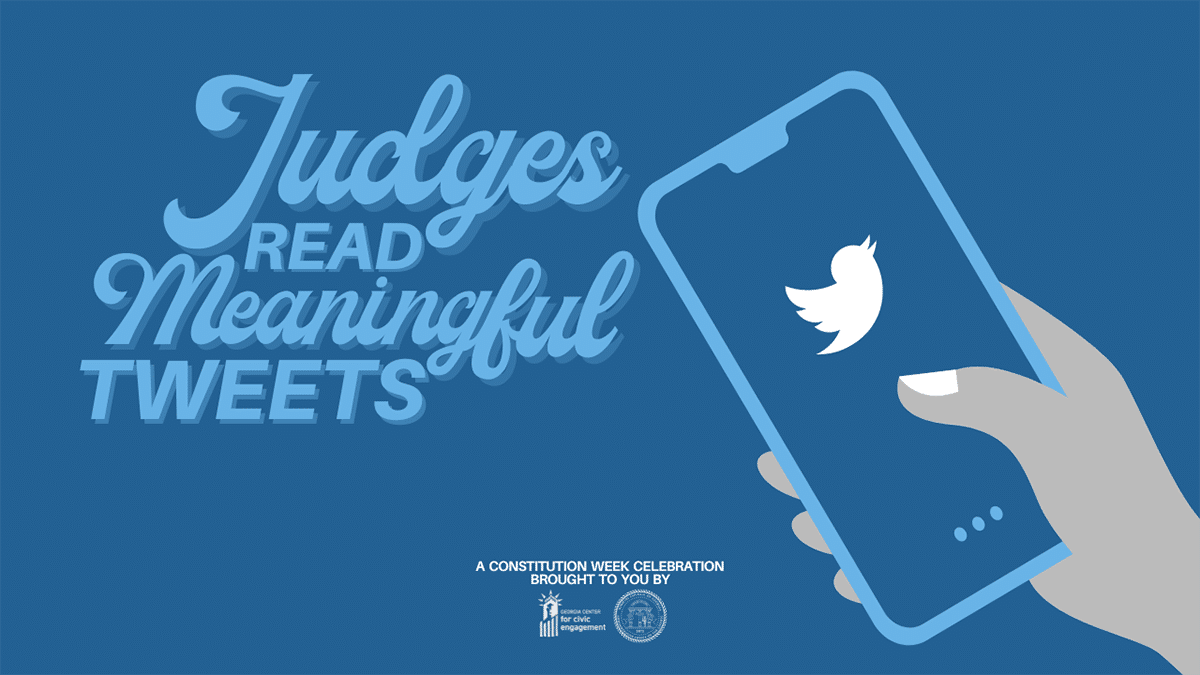Celebrating the U.S. Constitution and Guiding Youth Toward Active Citizenship
Print This Post
Georgia Center for Civic Engagement, Georgia Family Connection Partnership, and Judicial Council of Georgia / Administrative Office of the Courts Partner to Improve Georgia’s Civic Engagement
Civic education advocates and judges from across Georgia invite communities to come together to celebrate Constitution Day on Saturday, Sept. 17, to commemorate the signing of the foundational document in Philadelphia on Sept. 17, 1787.
These advocates and judges are doing that by promoting learning resources and connecting students with judges to ensure that the state’s younger generations understand the gravity of active citizenship and recognize the enduring strength of our Constitution.
According to the 2019 Georgia Civic Health Index, Georgia’s civic health is not strong on most measures when compared to other states—including attending public meetings, contacting or visiting a public official, and voting. Georgians also traditionally have had low levels of trust in public institutions. Building a knowledge base with high-quality civic education—paired with opportunities that bring community members together—can lead to improvements in our state’s overall civic health.
“Every year the National Center for State Courts conducts an annual survey to benchmark the public’s trust and confidence in their state courts, and the findings show waning results year over year,” said Georgia Supreme Court Justice Charles Bethel. “Georgia judges want to be part of improving those statistics.”
The Georgia Center for Civic Engagement (GCCE), Georgia Family Connection Partnership (GaFCP), and the Judicial Council of Georgia / Administrative Office of the Courts (AOC) released a video series today of Georgia judges responding to students’ questions about the U.S. Constitution titled Judges Read Meaningful Tweets—a play off the popular segment Celebrities Read Mean Tweets on ABC’s “Jimmy Kimmel Live!” The partners aim to raise awareness and inform students about the U.S. Constitution—the history of the document, how it’s applied by our three branches of government, and how understanding it can help students advocate for their own rights and make their voices heard—and at the same time, connecting students to members of Georgia’s judiciary. AOC will upload videos to the series every day this week through Constitution Day on Saturday.
“All of us have a role to play if we are to reverse these trends of eroding trust, especially those of us who represent our civic institutions,” said Georgia Court of Appeals Chief Judge Brian Rickman. “We’re looking for creative ways to do just that.”
GCCE Chief Executive Officer Randell Trammell agrees. “There’s no doubt about it. Our democracy needs a boost,” he said. “The best hope for creating a lasting change is by investing in our youth and helping them develop their ‘civic muscles.’ Programs like Judges Read Meaningful Tweets, mock elections, and model legislatures help students develop a stronger understanding of civic ideals all while building their civic identity.”
Teachers and students can access additional Constitution Day learning resources—including lesson plans, online games, and activities—for free at iCivics.org. iCivics is a national nonprofit organization founded in 2009 by retired U.S. Supreme Court Justice Sandra Day O’Connor, which champions equitable, nonpartisan civic education so that each new generation learns the practice of democracy and so students are inspired to lifelong civic engagement.
“Civic health has been on the decline across the nation for years—and Georgia has performed worse than the national average on most measures of civic health since at least 2013,” said GaFCP Executive Director Gaye Smith. “Communities that have higher levels of civic health tend to experience better outcomes overall—including lower violent crime rates, better public health, and stronger local economies. To ensure that our communities and democracy thrive, we must be intentional in our efforts to improve Georgia’s civic health—and a vital component of that is to provide all our young people with access to high-quality civic education and experiences.”
Contact:
Bill Valladares
GaFCP Communications Director
404-739-0043
william@gafcp.org
Michelle Barclay
Division Director/Communications, Children, Families & the CourtsJudicial Council of Georgia / Administrative Office of the Courts
404-374-4480
Michelle.Barclay@georgiacourts.gov
Follow us on Twitter: @gafcpnews
Connect with us on Facebook.
Georgia Family Connection Partnership (GaFCP) is a public-private partnership created by the State of Georgia and investors from the private sector to assist communities in addressing the serious challenges facing children and families. GaFCP also serves as a resource to state agencies across Georgia that work to improve the conditions of children and families.
Georgia Center for Civic Engagement is committed to comprehensive civic education, a multi-disciplinary approach that provides opportunities for educators to sharpen their skills to further impact students as well as provide opportunities for students to directly engage in experiences that will help develop a deeper civic knowledge, a stronger civic identity, and a commitment to a life of civic engagement.
The Judicial Council of Georgia was created in 1945 and serves as the policymaking body for Georgia’s judiciary. The Administrative Office of the Courts (AOC) was created in 1973. As staff to the Judicial Council, the AOC provides subject-matter expertise on policy, court innovation, legislation, and court administration to all Georgia courts. The AOC also furnishes information technology, budget, and financial services to the judicial branch. For more information, visit jcaoc.georgiacourts.gov.
